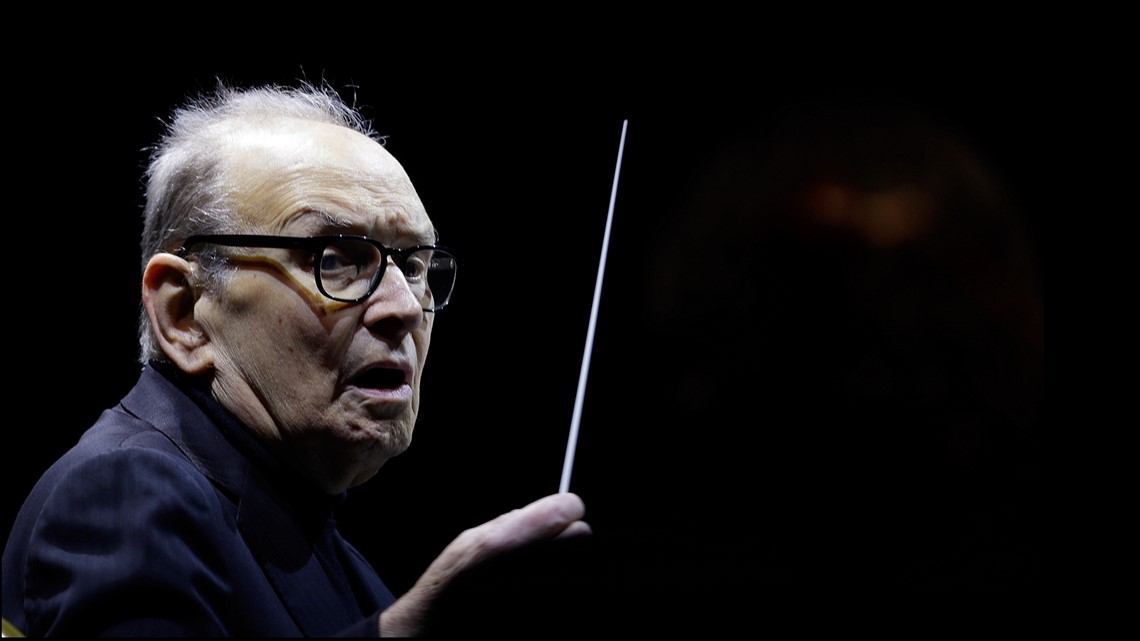ROME, Italy — Ocar-winning Italian composer Ennio Morricone, who created the coyote-howl theme for the iconic Spaghetti Western “The Good, the Bad and the Ugly” and often haunting soundtracks for such classic Hollywood gangster movies as “The Untouchables” and the epic “Once Upon A Time In America,” died on Monday. He was 91.
Morricone’s longtime lawyer, Giorgio Assumma, said the Maestro, as he was known, died in a Rome hospital of complications following a recent fall in which he broke a leg.
During a career that spanned decades and earned him an Oscar for lifetime achievement in 2007, Morricone collaborated with some of Hollywood's and Italy's top directors, including on “The Untouchables” by Brian de Palma, “The Hateful Eight” by Quentin Tarantino and “The Battle of Algiers” by Gillo Pontecorvo.
That Tarantino film would also win him the Oscar for best original score in 2016. In accepting that Academy Award, Morricone told the audience at the ceremony: “There is no great music without a great film that inspires it.”
In total, he produced more than 400 original scores for feature films.
His iconic so-called Spaghetti Western movies saw him work closely with the late Italian film director Sergio Leone.
Morricone was known for crafting just a few notes, like those played on a harmonica in Leone’s “Once Upon A Time in America,” which would be instantly associated with that film.
Morricone was credited with nothing less than reinventing music for Western movies through his partnership with Sergio Leone, a former classmate. Their partnership included the “Dollars” trilogy starring Clint Eastwood as a quick-shooting, lonesome gunman: “A Fistful of Dollars” in 1964, “For a Few Dollars More” in 1965 and “The Good, the Bad and the Ugly” a year later.


In 1984 Morricone and Leone worked together again on “Once Upon a Time in America,” a saga of Jewish gangsters in New York that explores themes of friendship, lost love and the passing of time. The movie starring Robert De Niro and James Woods is considered by some to be Leone’s masterpiece, thanks in part to Morricone’s evocative score, including a lush section played on violins.
“Inspiration does not exist,” Morricone said in a 2004 interview with The Associated Press. “What exists is an idea, a minimal idea that the composer develops at the desk, and that small idea becomes something important.”
In a later interview, with Italian state TV, Morricone cited “study, discipline and curiosity” as the keys to his creative genius.
More recently, Morricone provided the score for “The Hateful Eight,” Tarantino’s 2015 70-mm epic and the first time in decades that he had composed new music for a Western. It was also the first time Tarantino had used an original score. In accepting Morricone’s Golden Globe for the music in his place, Tarantino called him his favorite composer.
“When I say ‘favorite composer,’ I don’t mean movie composer. ... I’m talking about Mozart, I’m talking about Beethoven, I’m talking about Schubert,” Tarantino said.
Morricone’s style was sparse, made of memorable tunes and unusual instruments and arrangements. His music punctuated the long silences typical of the Spaghetti Westerns, with the characters locked in close-ups, staring at each other and waiting for their next moves. The coyote howl, harmonicas and eerie whistling of “The Good, the Bad and the Ugly” became Morricone’s trademark and one of the most easily recognizable soundtracks in cinema.
Minutes before handing Morricone the Oscar for lifetime achievement in 2007, Eastwood recalled hearing for the first time the score of “A Fistful of Dollars” and thinking: “What actor wouldn’t want to ride into town with that kind of music playing behind him?”
It was a night to remember for Morricone, who had been nominated for Oscars five times (“The Hateful Eight” brought him his sixth) but had at the point never won.
Born in Rome on Nov. 10, 1928, Morricone was the oldest of the five children. His father was a trumpet player.
After studying trumpet and composition at the Conservatory of the Accademia Nazionale di Santa Cecilia in the Italian capital, he started working as a trumpet player and then as an arranger for record companies.
“I started working on very easy kinds of music pieces for the radio, for television and then for the theater, and then little by little I started to compose the film scores,” he told the AP in 2016.
In 1961 he wrote his first score for a movie, a bittersweet comedy set in the final moments of Fascism called “Il Federale” (known in English as “The Fascist”). That decade also saw Morricone cooperate with Pontecorvo, first on “The Battle of Algiers,” the black-and-white classic depicting the Algerian uprising against the French; and later on “Queimada,” a tale of colonialism starring Marlon Brando.
Morricone received his first Oscar nomination for original score with “Days Of Heaven,” a 1978 movie by U.S. director Terence Malick. Beside “The Hateful Eight,” the others were for “The Mission” (1986), “The Untouchables” (1987), “Bugsy” (1991) and “Malena” (2000).
Shortly before his lifetime Oscar, Morricone joked that he would have been happy without the coveted statuette, saying “I would have remained in the company of illustrious non-winners.”
But he also made no secret that he thought “The Mission,” with its memorably sweet theme of “Gabriel’s Oboe,” deserved the Academy Award. That year, he lost to Herbie Hancock’s “Round Midnight.”
Asked by Italian state TV a few years ago if there was one director he would have liked to have worked with but didn't, Morricone said Stanley Kubrick had asked him to work on “Clockwork Orange.” But that collaboration didn't happen because of a commitment to Leone, Morricone recalled.

